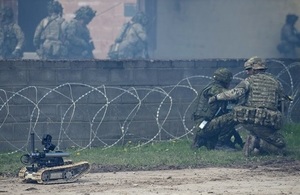UK and allies stand united in face of intensifying threats
Nine nations come together for Joint Expeditionary Force live demonstration

Soldiers take part in the Joint Expeditionary Force’s (JEF) military exercise on Salisbury Plain. Crown copyright.
Britain remains more committed than ever to our longstanding allies in the face of evolving and intensifying threats, including chemical and biological weapons, reaffirmed Defence Secretary Gavin Williamson today.
Speaking from the Joint Expeditionary Force’s (JEF) military exercise on Salisbury Plain, the Defence Secretary made clear the importance of the joint force in which the UK plays a leading role as the ‘framework nation’, working closely alongside Denmark, Estonia, Finland, Latvia, Lithuania, the Netherlands, Norway and Sweden.
Attending with Chiefs of Defence from all nine JEF member nations, Mr Williamson also commended the JEF’s ability to react to the full spectrum of operations, from humanitarian assistance and conventional deterrence, through to combat operations.
Defence Secretary Gavin Williamson said:
Nations are judged by the friends they keep. The exercise today sends a clear message to our allies and adversaries alike – our nations have what it takes to keep our people safe and secure in an uncertain world.
From counter-terrorism and anti-smuggling to information warfare, we are stronger by sharing expertise and developing joint tactics across air, land, sea and cyber.
The live capability demonstration featured troops from the nine JEF nations, including troops from the UK Parachute Regiment, the Danish Jutland Dragoon Regiment, the Lithuanian “Iron Wolf” Brigade and the Latvian Mechanised Infantry Brigade, conducting urban combat operations with air support provided by Apaches, Chinooks, Wildcats and Tornados.
The exercise is the culmination of two weeks of intensive and specialised training across the country, ranging from amphibious and naval activity in Wales and Scotland to land based training in Wiltshire and air activity across the UK; all part of Exercise Joint Warrior.
Nearly 12,000 military personnel from 17 nations took part in the training scenarios involving multiple sovereign nations disputing resources and territories; counter-terrorism and anti-smuggling activity; information warfare; and evacuation operations.
During his visit, Mr Williamson took time to visit the Defence Science and Technology Laboratory (DSTL), Porton Down who have provided a team of analytic specialists to the exercise. They provide vital analysis to support military commanders, giving crucial advice to help military leaders understand the risks and benefits of the decisions they make when planning tactical activities and manoeuvres during conflict.
DSTL Chief Executive Gary Aitkenhead said:
It has been an extraordinary time for all of us at Dstl, therefore it has been a pleasure to show the Defence Secretary some of the ground-breaking research that we do and the vital role Dstl plays in keeping our Armed Forces and the British public safe.
Our people are world-leaders in what they do and Mr Williamson’s visit today gave us an opportunity to showcase how we are delivering the Government’s priorities for defence and technology against a backdrop of ever changing threats.
Mr Williamson also met troops at Winterbourne Gunner who are helping with the decontamination efforts in Salisbury, following the poisoning of Sergei and Yulia Skripal in March.